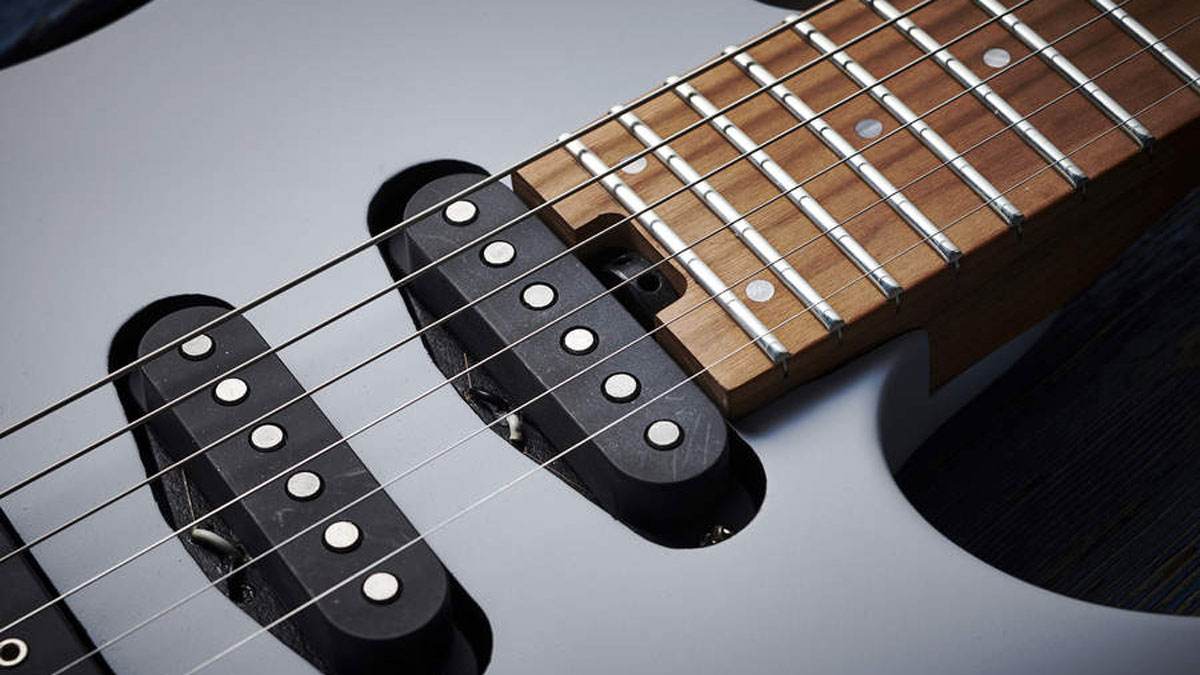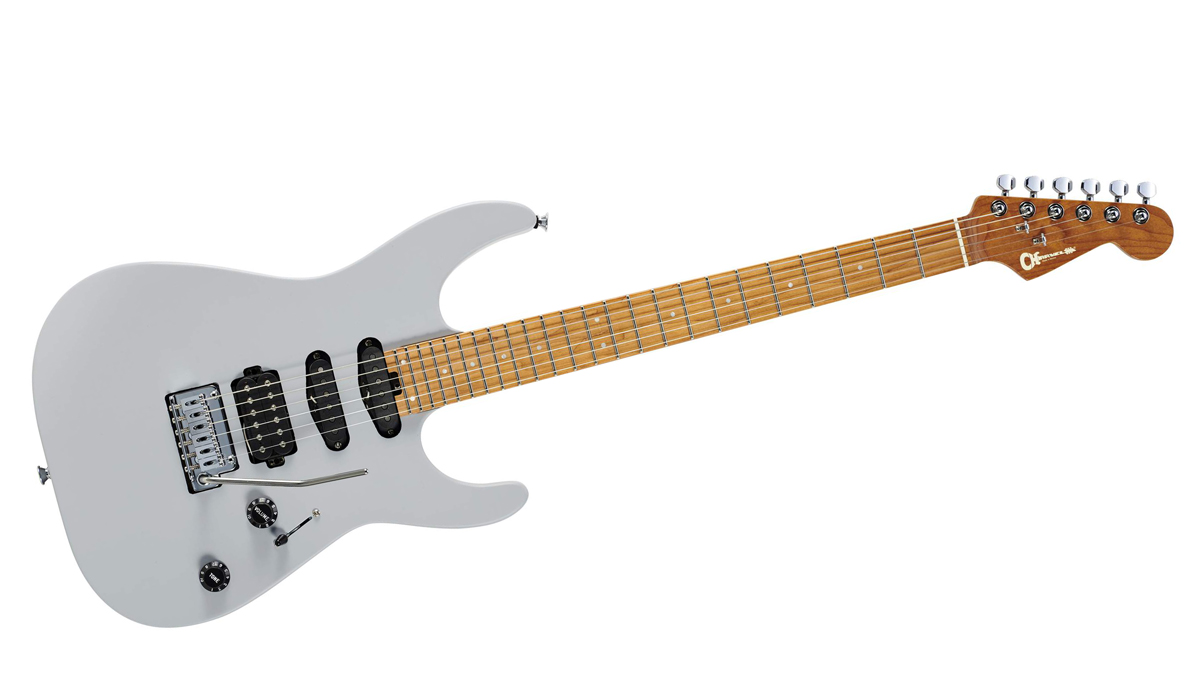MusicRadar Verdict
A modern classic.
Pros
- +
Beautifully realised and way more versatile than you might expect.
- +
Think you don’t like rock guitars - get a load of this.
Cons
- -
The only niggle is the missing case.
MusicRadar's got your back
Everyone knows that old expression, ‘we buy with our eyes’.
To that end, some of you have probably already dismissed this new Charvel Pro-Mod DK24 electric guitar as an 80s throwback or ‘shred machines’. But, just hold your fire...
Skipping down the spec sheet you’ll find an offset ‘Dinky’ alder body at the nucleus of the guitar. Ribs and beer bellies alike are catered for with your classic Strat-style rear contouring. The front of the body is also sculpted for your right forearm. As you’d expect on a guitar of this species, the bit where the neck bolts to the body is ergonomically profiled to assist upper-fret access. The rear of the treble side cutaway has also been sculpted to get your fingers where they need to be, fast.
Our Primer Gray DK24 shares the same back and middle pickups as the recently-reviewed HSH. It lives up to its HSS format, however, by replacing the humbucker with another SSL-6 Custom Flat Strat single coil at the neck. This SSL-6 is the hum-cancelling ‘RWRP’ (‘reverse wind, reverse polarity’) version. The knob that will likely see the most action is the speedy 500kohm EVH Bourns Low-Friction master volume. You also get a No-Load master tone and a five-way pickup selector blade switch.
The DK24 is supposed to be a modern shred machine, so where’s the obligatory double-locking Floyd Rose vibrato? Floating, of course. Well, our guitar features a much simpler setup. The Gotoh Custom 510 six-saddle bridge is a modern take on the classic Strat ‘Synchronized’ vibrato. Poised on twin posts, it pivots above a body recess that allows it to swing both ways. The screw-in arm has its thread running through its insides. It mates with a screw in the 510’s steel block providing a firm connection. You don’t get that disconcerting wiggle you often experience in worn traditional threaded vibrato arms, or the infuriating ever-loosening screw-on sleeve you’re stuck with on many licensed Floyds. The other end of the strings are secured to a set of Charvel-branded die-cast locking tuners. Further tuning stability is assured with a perfectly cut, and super slippery, Graph Tech TUSQ XL top nut.

Until now, we’ve held back on what makes this guitar a bit more special. You might have noticed the honey-tinged vibe of the bolt-on maple neck. Charvel refers to this effect as ‘caramelised’. You’ve probably seen this process described as ‘roasted’ on Fender Custom Shop Strat and Tele necks. Other manufacturers use terms such as ‘baked’, ‘toasted’ and, in the case of numerous acoustic guitars, ‘torrified’. Caramelised maple is cooked in a kiln at over 300 degrees. The result is a timber that has much less moisture than regular maple, is lighter yet stronger, and resists changes in temperature and humidity. It also looks pretty.
While caramelised maple doesn’t require a finish, Charvel has spec’d a thin hand-rubbed urethane coating. It makes this caramel treat extra sweet to play... not sticky. The cooking process also aims to make the necks stiffer. Again, Charvel has gone all belt and braces with a couple of graphite rods for additional reinforcement. The neck is two-piece thanks to the use of a 305 to 406mm (12- to 16-inch) radius maple cap. That explains the lack of a skunk stripe round the back. It reminds us of the necks on ’68 and ’69 Strats. The 648mm (25.5-inch) scale length accommodates 24 jumbo frets and a bunch of small dot inlays. The side markers are cut from something called Luminlay, which lights up when you’re on a darkened stage.
Want all the hottest music and gear news, reviews, deals, features and more, direct to your inbox? Sign up here.
Before we move on, we must doff our caps to the Strat headstock. It evokes the early days of modified Fenders and Eddie Van Halen’s groundbreaking Frankenstein. Other manufacturers can’t use this headstock, of course, but Charvel can ’cos it’s ‘one of the boys’ and owned by Fender.
Sounds
This Charvel is obviously a modern rock machine, so you would expect the neck to be more caramel wafer than caramel log. It is slim but not quite as insubstantial as, say, an Ibanez Wizard neck. Unless you’re pathological about 50s baseball-bat necks, you should get on okay here.
While the recessed 510 vibrato returns to pitch flawlessly, it doesn’t have quite the range of a Floyd. It will dump the strings on the pickups like a load of metal spaghetti, but there’s less pull-back potential. It’s a small price to pay for the stress-free string changing and intonation adjustment.
Before we continue, let’s check in with the slightly unusual pickup switching. Position 1 gives you the bridge pup on full power; position 2 is the Full Shred’s inner coil and middle SSL-6 single coil; at position 3 you get a combo deal on the bridge pickup’s outer coil and the neck single coil, sort of Tele-like. Position 4 is the middle and neck, and position 5 is neck only.
As previously noted, a Seymour Duncan Full Shred ’bucker occupies the bridge position. This is described by Duncan as a “bright, moderate-output rocker with a tight low-end, and scooped mids”. Output is ranked at 14kohms and that’s fuelled by the Alnico 5 magnets. It isn’t as brutal-sounding as the moniker suggests and actually reminds us of the iconic SH-4 JB, albeit with slightly lower output (the JB is 16.6k) and less midrange punch. The Full Shred holds its own through the gain scale from jangly clean to blues-rock and widdly metal. We especially like the tonal right hook it brings to bottom-string riffs.
At a touch under a grand, this guitar still offers excellent value for money
The overwound middle position SSL-6 Custom Flat Strat comes in at 13.3k. The flat magnet format is designed for guitars with an equally flat fingerboard radius. This pickup is punchy and beautifully defined and we like how it interacts with the bridge pickup in coil-split mode. You get that glassy Little Wing thing many of us can’t get enough of. The HSH’s neck-position Alnico Pro-II comes loaded with Alnico 2 magnets and a 7.5k output for more of a vintage delivery. Its warmer tone sounds great for jazzy stuff and blues noodling when you kick in some overdrive.
The DK24 HSS pairs the middle SSL-6 with a neck-loaded RWRP example that’s hum-cancelling when both pups are running in cahoots. While we like the clarity punching its way out of the neck SSL-6 single coil, we prefer the fat warmth of the Alnico Pro-II. The latter pickup splits when used in conjunction with the middle pup, so you get a fairly similar sweet single/ single tone on both DKs.
The beautiful caramelised neck is fast without being too thin; the body is lightweight and balances beautifully on a strap. Then there’s the Gotoh 510 vibrato that offers almost all the performance of a locking Floyd without faffing around with Allen keys. Tuning stability is excellent.
We can’t conclude without mentioning that the build quality and attention to detail places this DK24 above much of the competition. We would like to have seen a case or gigbag included in the price, but at a touch under a grand, this guitar still offers excellent value for money.
“It’s still a shred guitar,” we hear you cry. Actually, spec-wise, the DK24 isn’t a million miles away from something like a Suhr Modern. Once you get a grip of those caramel-coloured necks, you might not be so toffee-nosed about what we reckon is a modern classic.
